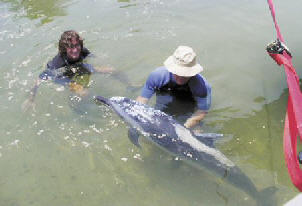|
MIDDLE KEYS -- A spotted dolphin that beached itself off Marathon Monday began swimming on its own Friday, a sign that the marine mammal may be improving, according to volunteers trying to nurse it back to health.
Meanwhile, a pilot whale that was among more than two dozen whales that stranded themselves near the Content Keys two weeks ago, has died.
The dolphin, dubbed Sunny, is being treated for dehydration and severe sunburn at Keys Marine Lab in Layton, said Sarah Gomez with the Miami-based Marine Animal Rescue Society. Rescuers are treating the mammal with antibiotics and are awaiting the results of blood tests.
Rescuers were unsure the dolphin's exact age, but called him a "young male." They also were unsure why the spotted dolphin, which usually moves in large pods, beached itself.
Maria Brandvold and her husband Jan Childers spotted the 5-feet, 4-inch, 125-pound dolphin on a sandbar near Sunrise Island off Marathon. Brandvold said she was at home and looking out her back window admiring the birds when she spotted something struggling in the ocean.
"I saw something black flopping on the beach and called to Jan when I realized what it was," said she said. "We just had to give him a name, so we named him Sunny."
The rescue became a neighborhood effort until Florida Fish and Wildlife Conservation officers and rescuers arrived.
The dolphin is being tube fed formula and is receiving 24-hour medical care.
In another recent stranding situation, the lone surviving male pilot whale being cared for in a lagoon on the south end of Big Pine Key died Thursday evening. The whale, one of seven rescued after a pod of 28 whales beached themselves in Content Passage two weeks ago, had been receiving antibiotics and around-the-clock medical treatment. The male is the second of the rescued whales to die since being moved to protected waters. And undermined number of the original pod died in backcountry waters in the days following the stranding.
Five whales, all females, remain under the care of volunteers and appear to be responding well to medical treatments.
Rescuers, comprised primarily of volunteers from various non-profit marine mammal-stranding agencies, are seeking donations and volunteers to aid in the efforts.
For more information, call (305) 546-1111
Top
|
